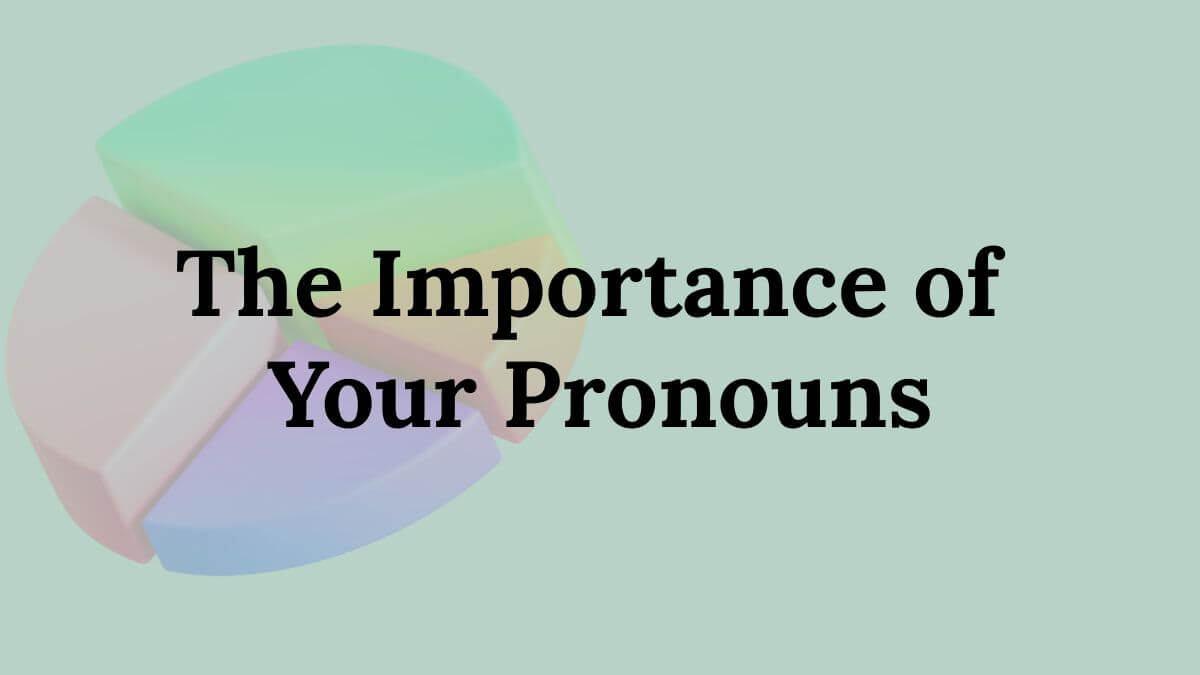Pronouns are small but powerful words that play a big role in how we communicate and understand each other. Whether you’re learning English or teaching it, recognizing the importance of your pronouns helps build respect, clarity, and confidence in everyday conversations.
This blog post will guide you through the meaning of pronouns, why they matter, and how to use them correctly in English. Let’s celebrate yourself by appreciating the language that represents you!
What Are Pronouns? Understanding the Basics
Pronouns are words used to replace nouns, especially people’s names, to avoid repetition and make sentences smoother. Pronouns like he, she, they, it, we, and you serve as essential placeholders, making our conversations smoother and more connected.
For example:
- Instead of saying, Maria finds joy in sharing knowledge – it’s no surprise she’s a passionate teacher. She loves teaching.”
- Instead of: Tom lost Tom’s phone, so Tom bought a new one.
Use: Tom lost his phone, so he bought a new one. - Instead of: The students said the students finished the students’ homework.
Use: The students said they finished their homework. - Instead of: Lisa and I went to Lisa and my favorite café.
Use: Lisa and I went to our favorite café.
Why Pronouns Matter in English
Pronouns are everywhere in English. They help us speak efficiently, express identity, and show respect. When we use the right pronouns, conversations feel natural and inclusive. This is why understanding the importance of your pronouns is essential, especially for English learners who want to sound confident and respectful.
The Importance of Your Pronouns in Communication
Pronouns Reflect Identity and Respect
Using the correct pronouns is about more than grammar – it’s about recognizing and respecting people’s identities. Each person has pronouns that reflect who they truly are and how they wish to be seen. When you use someone’s preferred pronouns, you show that you see and honor who they truly are.
For instance:
- If someone uses they/them pronouns, saying “they went to the store” respects their identity, even though they is traditionally plural.
Pronouns Help Avoid Confusion
Pronouns prevent awkward or repetitive sentences. They also help listeners understand who or what you are talking about without constant repetition.
Example:
- Tom and Jerry are friends. They often play together.
Without pronouns, our sentences would stumble – longer, clumsier, and far less clear.
Types of Pronouns You Should Know
English has several types of pronouns. Knowing these helps learners use language correctly and with confidence.
Personal Pronouns
These refer to specific people or things.
| Subject | Object | Possessive |
| I | me | my/mine |
| You | you | your/yours |
| He | him | his |
| She | her | hers |
| It | it | its |
| We | us | our/ours |
| They | them | their/theirs |
Example:
- I like my book.
- She gave her pen to him.
Reflexive Pronouns
These end with -self or -selves and refer back to the subject.
Examples:
These reflective pronouns – myself, yourself, himself, herself, itself, ourselves, yourselves, themselves – shine when the subject and object of a sentence are one and the same, adding emphasis or clarity with precision. The Importance of Your Pronouns
Sentence:
- She taught herself English.
Demonstrative Pronouns
Used to point to something specific: this, that, these, those.
Example:
- This is my favorite book.
How to Use Pronouns Correctly
Match Pronouns with the Right Nouns
Ensure pronouns match the nouns they replace in both number and gender to keep your sentences clear and correct.. The Importance of Your Pronouns
Correct:
Sure! Here’s a unique version of that sentence:
- Anna smiled with joy after discovering she had aced the exam.
Incorrect:
- Anna is happy because they passed the test.” (Unless Anna uses they/them pronouns.)
Use Pronouns to Avoid Repetition
Sure! Here’s a unique line for that concept:
Use pronouns to avoid repeating nouns and keep your sentences clear and natural.
Example:
- Repetitive: “John likes John’s bike because John bought John’s bike last year.”
- With pronouns: “John likes his bike because he bought it last year.”
Be Aware of New Pronoun Uses
Language evolves! Many people prefer they/them as singular pronouns, or other pronouns like ze/hir. Always listen and respect the pronouns people choose.
The Role of Pronouns in Different English Contexts
In Formal Writing
Pronouns help maintain clarity without sounding repetitive. But in some formal contexts, avoid overusing pronouns that could confuse the reader. The Importance of Your Pronouns
Example:
- Use proper nouns when clarity is necessary.
In Everyday Conversation
Pronouns make speaking more natural and quicker.
Example:
- Instead of saying full names all the time, use pronouns to keep the flow.
In Teaching English
Teaching the importance of your pronouns helps students communicate respectfully and correctly. Teachers should introduce pronouns early and provide lots of practice.
Read More:
A Simple Guide to the Parts of Speech with Examples
7 Common Mistakes with Auxiliary and Modal Verbs – And How to Fix Them!
Pronouns and Inclusivity: Why It Matters Today
Respecting pronouns is part of making communication inclusive. When teachers and learners focus on the importance of your pronouns, it encourages kindness and understanding in diverse classrooms and communities.People feel seen and accepted when their pronouns are used correctly, making language learning a more welcoming experience. The Importance of Your Pronouns
Fun Practice: Try Using Pronouns in Sentences
Try filling in the blanks with the right pronouns:
- Sarah and I went to the market. ___ bought some apples.
- That is my book. Please give it to ___.
- Alex said ___ would join us later. (Alex uses they/them pronouns)
Conclusion
Understanding the importance of your pronouns is key to effective, respectful communication in English. Pronouns are more than grammar – they reflect who you are and how you want to be seen.
